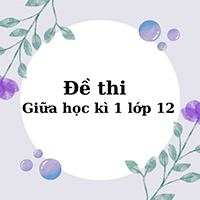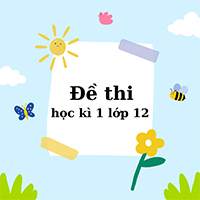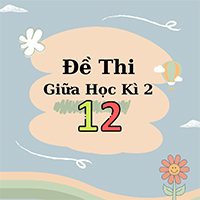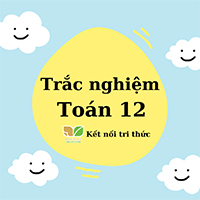Giải bài tập SGK Tiếng Anh lớp 12 Chương trình mới Unit 5: Cultural identity
Giải bài tập SGK Tiếng Anh lớp 12 Chương trình mới Unit 5
VnDoc.com xin gửi đến đến các bạn Giải bài tập SGK Tiếng Anh lớp 12 Chương trình mới Unit 5: Cultural identity do VnDoc.com sưu tầm và đăng tải sẽ mang đến cho các bạn nội dung giải chi tiết và dễ hiểu, giúp các bạn có một bài học hiệu quả, chuẩn bị tốt nhất cho những bài kiểm tra và bài thi sau này.
Bài ôn tập Tiếng Anh lớp 12 Unit 7, 8 có đáp án
Ngữ pháp Tiếng Anh lớp 12 Unit 11: Các trường hợp đặc biệt của câu bị động
Getting Started - trang 58 Unit 5 SGK tiếng anh 12 mới
Tổng hợp các bài tập trong phần Getting Started - trang 58 Unit 5 SGK tiếng anh 12 mới
1. Listen and read. (Nghe và đọc)
Mr Brown: Hello everybody. Hope you're all working on your essay on cultural identity. Do you have any questions?
Van: Yes. I'm not quite sure about how people express their cultural identity.
Mr Brown: That's an interesting question. Can anyone give some examples?
Lam: I think people can do that through the language they speak, the food they eat and ... certain styles of clothing. For example, some people still wear their traditional costumes so they can preserve their national identity.
Mr Brown: That's right. It can also be expressed by beliefs and cultural practices.
Yumi: Do you mean people's religious beliefs, music activities and festivals?
Mr Brown: Correct. Any other questions?
Lam: I wonder... why people need to protect their cultural identity.
Yumi: You live here, in your motherland, so you can't see why this is important. But for me, a Japanese living in Vietnam, it's essential to understand my family history and traditions.
Van: Interesting. Are your parents both Japanese, Yumi?
Yumi: Yes, but they've been living here for twenty years, and they're afraid that my sister and I are becoming less and less familiar with our traditions.
Lam: So how do you maintain your culture?
Yumi: Well, we wear kimonos on special occasions and celebrate Japanese festivals such as the cherry blossom festival. We also eat sushi, sashimi and udon noodles. At home we speak Japanese only.
Van: Do you often go back home?
Yumi: I've been to Kyoto four or five times to visit my grandparents. But to tell you the truth, I don't know whether Viet Nam or Japan is really my home. My parents are from Japan, but I was born and grew up here.
Mr Brown: I'd be interested to read about your experiences in Viet Nam in your essay, Yumi. OK, just to remind you that the essays are due next Wednesday and late submissions won't be accepted.
2. Complete the diagram. (Hoàn thành sơ đồ.)
Hướng dẫn:
1. language 2. food 3. clothing
4. beliefs 5. cultural practices
3. Answer the questions. (Trả lời các câu hỏi)
1. According to Yumi, why do people need to protect their cultural identity?
2. How do Yumi's family maintain their culture?
3. Where is home for Yumi?
4. Give examples of expressions of cultural identity in your community.
Hướng dẫn:
1. Because it's essential to understand their family history and traditions.
2. They wear kimonos on special occasions and celebrate Japanese festivals. They eat sushi, sashimi and udon noodles. They also speak Japanese at home.
2. She doesn't know whether her home is Japan, where her parents come from, or Viet Nam, where she was born and grew up.
4. (Suggested answer) Language: Vietnamese; food: square and round sticky rice cakes, pho; clothing: ao dai, ao ba ba; beliefs: ancestor worship (= thờ cúng tổ tiên); cultural practices: Hung Kings' Festival, Quan ho singing
4. Find the verb or adjective that goes with each of the following nouns or noun phrases. If necessary, use a dictionary to check the meaning. (Tìm các động từ hoặc tính từ mà đi với các danh từ hoặc cụm từ sau danh từ. Nếu cần thiết, sử dụng từ điển để kiểm tra ý nghĩa.)
1. ________ their cultural identity
2. ________ costumes
3. ________ practices
4. ________ my family history
5. ________ your culture
Hướng dẫn:
1. express/ protect
2. traditional
3. cultural
4. understand
5. maintain
5. Read the conversation again and write the correct tenses of the verbs in brackets. (Đọc cuộc trò chuyện một lần nữa và viết các thì đúng của động từ trong ngoặc đơn.)
1. My parents (live)____________ here for twenty years.
2. I (be)_____________ to Kyoto four or five times to visit my grandparents.
Hướng dẫn:
1. have been living
(Note: The present perfect is also possible: ‘My parents have lived ...’)
2. 've been
Language - trang 60 Unit 5 SGK tiếng anh 12 mới
Tổng hợp các bài tập trong phần Language - trang 60 Unit 5 SGK tiếng anh 12 mới
Vocabulary
1. Write the words or phrases given in the box next to their meanings. (Viết những từ hoặc cụm từ được đưa ra trong các hộp bên cạnh ý nghĩa của chúng.)
assimilate, maintain, national, costumes, custom, cultural, practices, multicultural
1 .the traditional clothes worn by people from a particular country on special occasions
2. become part of a country or community by fully integrating into their society or culture
2. a traditional way of behaving and doing things in a particular society
3. make something continue in the same way as before
4. activities related to religion, art, customs, diet, etc.
5. including people of different races, religions, languages and traditions
Đáp án:
1. national costumes
2. assimilate
3. custom
4. maintain
5. cultural practices
6. multicultural
2. Complete the sentences with the correct form of the words in 1. (Hoàn thành câu với các hình thức đúng của từ trong 1.)
1. Some ethnic groups have strange ___________ such as walking on fire to prevent natural disasters.
2. The Vietnamese people still follow the___________of giving lucky money to children during theTet holidays.
3. The oo dai, cheongsam, kimono and sari are women's______________ in some Asian countries.
4. Many ethnic groups find it difficult to ___________their own language or preserve their culture.
5. People living in a(n)___________ society should learn to respect and understand different cultural values.
6. Mgrants may lose their cultural identity as they become _______________ into the new community.
Hướng dẫn:
1. cultural practices
2. custom
3. national costumes
4. maintain
5. multicultural
6. assimilated
Pronunciation
Assimilation
1. The following phrases are spoken in slow careful speech and in fast, connected speech. Listen and repeat. Pay attention to the pronunciation of the underlined sounds. (Các từ ngữ dưới đây được nói trong bài phát biểu cẩn thận chậm và nhanh được kết nối. Lắng nghe và lặp lại. Hãy chú ý đến cách phát âm của các âm thanh được gạch dưới.)
|
no assimilation in slow, careful speech |
with assimilation in fast, connected speech |
|
a. great culture shock |
b. great culture shock |
|
a. good cook |
b. goodcook |
|
a. garden gate |
b. garden gate |
|
a. essay on culture |
b. essay on_culture |
|
a. express your opinion |
b. express your opinion |
|
a. quiz show |
b. quiz show |
2. Listen and repeat the following sentences spoken in fast, connected speech. (Nghe và lặp lại các câu sau đây)
1. He experienced great culture shock when he firstcame to Europe.
2. The man in the red car over there is a good cook.
3. Please don't leave the garden gate open.
4. You can express your opinions at the end of this show.
5. There's a quiz show on Channel 7 tonight.
Grammar
1. Put the verbs in brackets in the present perfect or present perfect continuous. (Đặt động từ trong ngoặc ở thì hiện tại hoàn thành hoặc hiện tại hoàn thành tiếp diễn.)
Đáp án:
1. have cleaned
2. have been trying
3. has stood
4. has been working, has planted
5. have gone
6. haven't finished









